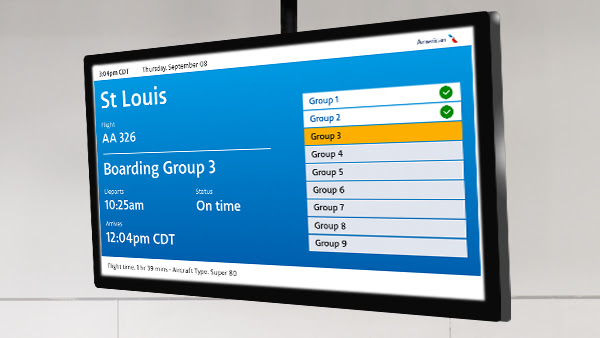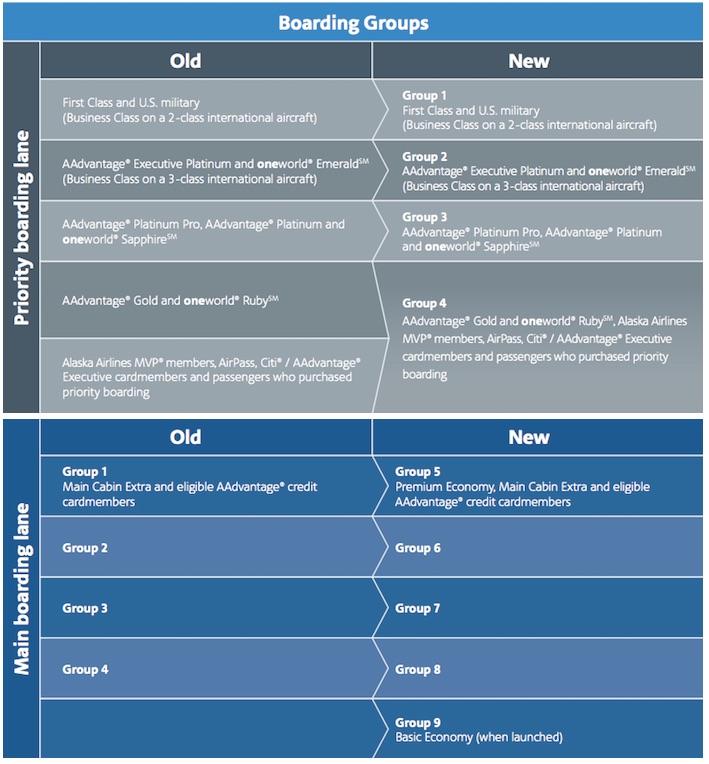American Airlines makes class warfare easier with 9 clear boarding groups
American Airlines announced new names for the groups in its boarding process. This made it much clearer how, if you’re an ordinary non-preferred customer, you’re one step above steerage. The clarity is great: it further weaponizes envy even as it deflect attention from the privileges American is slowly squeezing out of flying.
Here’s the email that I (and all other American Airlines Frequent Flyers) received yesterday:
Introducing a new boarding process
Simplified boarding process
Same order, new group names

Starting March 1, we’re simplifying the boarding process and introducing new boarding group names — numbers 1 through 9. The boarding order will not change, just the group names.
As an AAdvantage® Platinum member, you will continue to be the third group to board, which will be referred to as Group 3. You will still board through the Priority boarding lane.
This is followed with a button that links to a description of the new boarding process.
Is the uproar about changing names, or customer experience
After American Airlines changed the names, the critics came out of the woodwork.
Jay Baer, in his Jay Today videocast, asks “would you rather have the airline confuse you or marginalize you?” He wonders if they focus-grouped this, especially for the people in Group 9.
In MarketWatch, Christopher Elliott, a consumer travel advocate, said, “This is a case study in corporate double-speak.” He added, “American has created at least eight distinct groups of passengers, from the have-nots to the have-it-alls. This kind of stratification would make even an aristocrat blush. It has absolutely no place in the 21st century.”
Let’s take a look the old and new names, in this graphic from One Mile at a Time:

It’s clear why they made the change. In the past, when gate agents announced who was boarding when and listed the different status levels and classes, there was much confusion at the gate. The emotionally charged atmosphere was worse because the people who boarded later (the ones in groups 4 to 9 in this chart) were more likely to be confused, annoying the frequent flyers in the first few groups who imagined they were members of a more exalted species.
Some of these status-impaired people, confused by the announcements, strode up to the podium ahead of their spot. At that point the gate agent might have had difficulty identifying if they belonged there and let them in, or shunted them aside for jumping the line. Either way, this pissed off the strutting peacocks with status.
The new process eliminates the problem. You don’t have to figure out if you’re Emerald, Ruby, Sapphire, Platinum, or Executive Platinum — or have some special spot in line because you either got a Citibank American Airlines credit card with some inflated annual fee or purchased a special seat with 1.7 inches more legroom. They figure it and give your a group number.
This is much clearer. It is the opposite of double-speak.
It’s easier for the gate agents, who don’t have to verify what card you hold or whether you got a special seat.
Good work, American Airlines!
Why this still feels like crap
Wait a minute, you’re thinking. There is still a problem. And there is, from a customer experience standpoint.
To enhance the value of its frequent flyer classifications, American has created five classes of advantaged service. You used to need a secret decoder ring to figure them out; now they’re just Group 1 through Group 5. But there are still five ranks on this ladder.
They’re not done monkeying around at the low end, either. The new Group 9 is Basic Economy, similar to the low, low class that United Airlines announced last year. Those tickets have no overhead bin space and the airline assigns you your seat, you don’t get to pick it. And you board last.
American has rejiggered seat spacing, packed us in like salarymen on the Tokyo subway, and is now removing every possible amenity for those with less expensive tickets. This is a neat trick, because it creates resentment and competition between passengers, deflecting their anger from the airline itself. The Group 1s and 2s look down their snouts at the 3s. The 4s and 5s aspire to the be 2s and 3s some day. The people in the cheap seats — the 6s, 7s, 8s, and especially the new 9s — suffer and vow to spend a little more in the future. Every bit of that dynamic creates profit for American Airlines; they laugh and laugh as we fight over inches of bin space and knee space.
I salute the new clarity. But the announcement could be clearer still. So I rewrote it for you:
Know your place
Hi. As an American Airlines frequent flyer, we know you may have noticed confusion at the gate as we call different classes of service to embark onto our planes.
We’ve now taken steps to eliminate that problem. As you board, your boarding pass or mobile device will indicate your group number, from 1 to 9.
By doing this, we clearly label each passenger. We encourage you to envy those in groups higher than yours, and disdain those in lower groups. We promise to continue to remove privileges and space for less expensive seats, allowing you to feel superior to them and thereby creating a demand for upgrades to regain those benefits.
We know this creates resentment, so we created an ad campaign to make you feel friendly towards others and feel good about your superiority. That’s either our contribution to making the world better or our penance for making it angrier. You decide.
Since all the other airlines will have similar classifications, you may as well fly with us. If you get upset and switch to, say, United or Delta, you’ll lose your status and go straight to the back of the line.
America has become polarized into different, resentful groups. Now we’ve done our part to reflect those same divisions on our aircraft. We hope you enjoy the results.
And for me the best was that American “deleted” 100,000 miles from my account since I had not flown for a few years. They need a new group called #10 for those hapless souls who have been deleted.
Christopher – I hope you “deleted” American from your list of possible carriers for your next flight.
Mr. Geiger try calling AAdvantage. If you didn’t receive an alert from AA informing you your miles might expire, they may reinstate them for you (though they may require you take a certain number of flights). The AAdvantage T&Cs state miles expire after 18 months of inactivity. I received an email from AA advising me my miles were about to expire, which allowed me to act to keep my miles.
As an infrequent flyer, I find airport language strange. For one example, hearing the same final boarding call more than a dozen times over half an hour brings into question the definition of “final.” For another, the phrase “at this time” seems to be required in every announcement. And yes, its use of “aspirational” terminology reveals how little the airline thinks of its customers. We all get packed in the same can, and to pretend otherwise is a cheap conceit.
Now, hoping the comment system allows URLs, here’s a more concise take on the same situation: http://www.art.com/products/p43196135490-sa-i10145850/matthew-diffee-once-again-we-re-boarding-only-our-elite-premium-passengers-at-this-time-new-yorker-cartoon.htm?sOrig=CAT&sOrigID=0&dimVals=5420334&ui=98D5F7A793764E00A3A5E5134515792C
When I worked in Continental’s marketing department, we banned the phrase “last and final boarding call,” pointing out its redundancy). We made it clear to our airport management and agents that only the absolute last boarding call could use the statement “this is the last boarding call.” That lasted maybe two years at most.
What, no Group W bench?
Airlines are not well-liked. Pick a reason, everybody’s got one. But there’s a big positive we never think about: price. It’s still darned cheap to fly across the country even when prices fluctuate maddeningly with the price of fuel. When the airline industry goes bust, and it will sooner or later, we’ll all wonder what we hated so much about it as the time and cost of traveling immediately turns long distance travel into America’s Long National Nightmare—sans Nixon, of course.
We Americans are a strange breed. Our pride in exceptionalism is neurotically bound to our sense of entitlement. We are all superior being, some of us more superior than others, and we all have Lake Wobegone Syndrome. We all believe we are above average and, therefore, entitled to the appropriate perks.
What United Airlines should have done is create 20 boarding groups but use only 9. That would have given us all the feeling that we’re better than more than half of our travelling brethren.
I don’t think airlines will go bust — not collectively, at least (barring another terrorist event like 9/11 or a sudden and massive surge in fuel prices). Airline profits have never been stronger, due to industry consolidation and the combination of fees/optional products airlines sell. We now have the “core four” airlines — American, Delta, Southwest, and United , which collectively control >80% of US airline capacity — and their net margins are now ~10% or better.
American’s CEO, Doug Parker, said in an interview last year that he didn’t think AA would ever lose money again. Um, good luck with that. I’m not as confident. However, as a result of consolidation, new business models, improved pricing/revenue management systems, and airlines’ willingness to respond more quickly to market conditions, I don’t think we’ll see airlines hemorrhage money like they once did. Let’s also not overlook that Warren Buffett recently made significant investments in several airlines.
I like the idea of the creating 20 boarding groups, but using only a subset to make everyone feel special. Brilliant.
I know it’s a bit like comparing apples and cigars, but Southwest still somehow manages to get people on and off the airplane (written from an AA flight in progress).
Oh, but it’s a good ad campaign. That makes everything better.